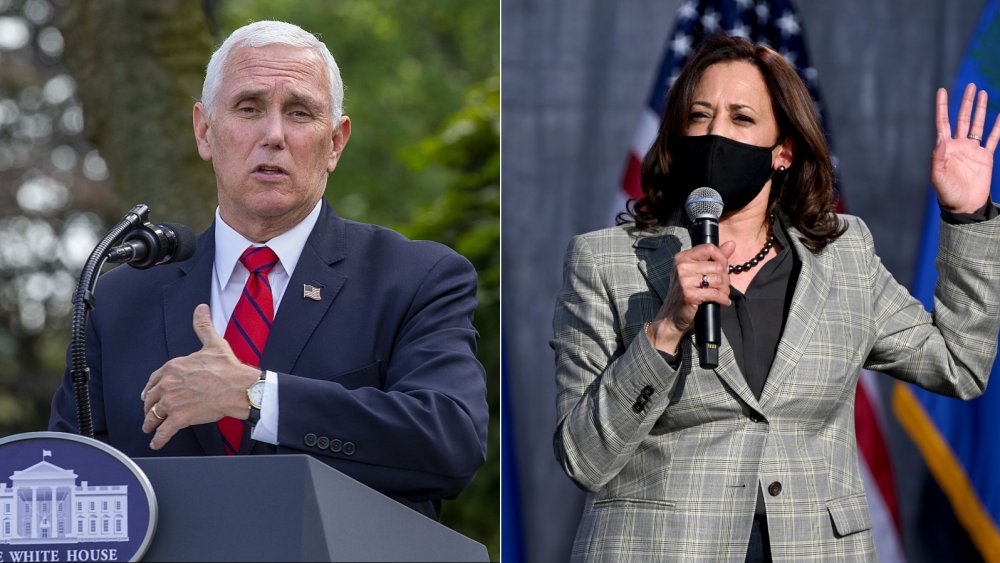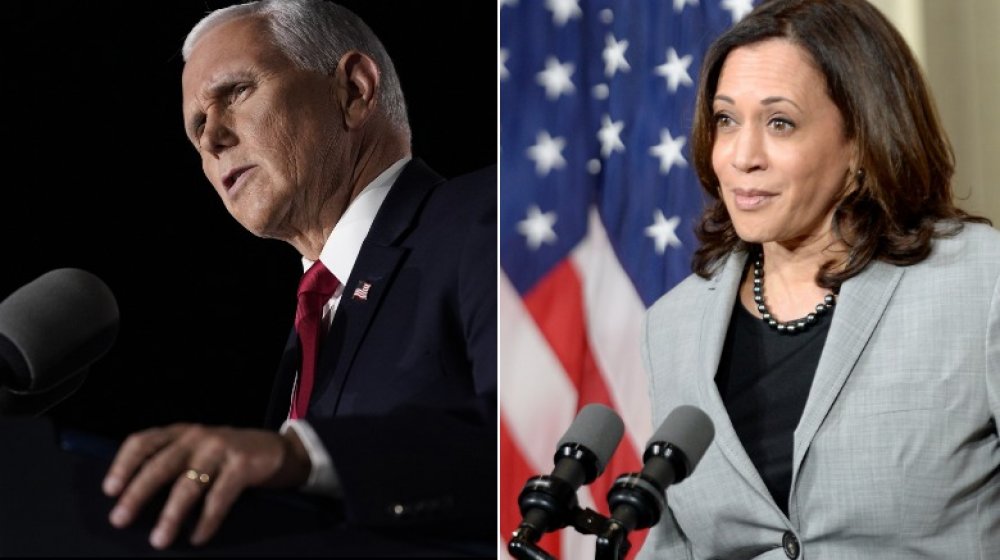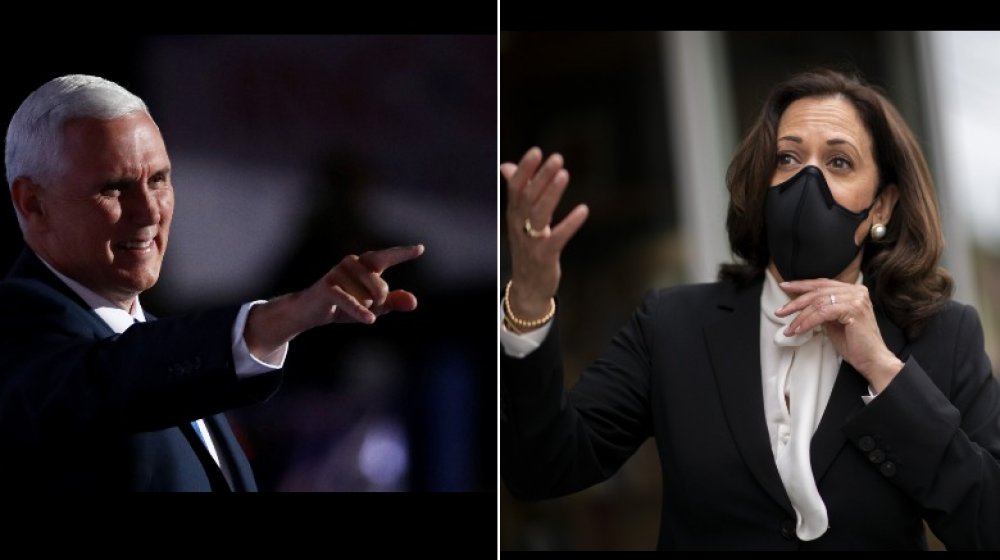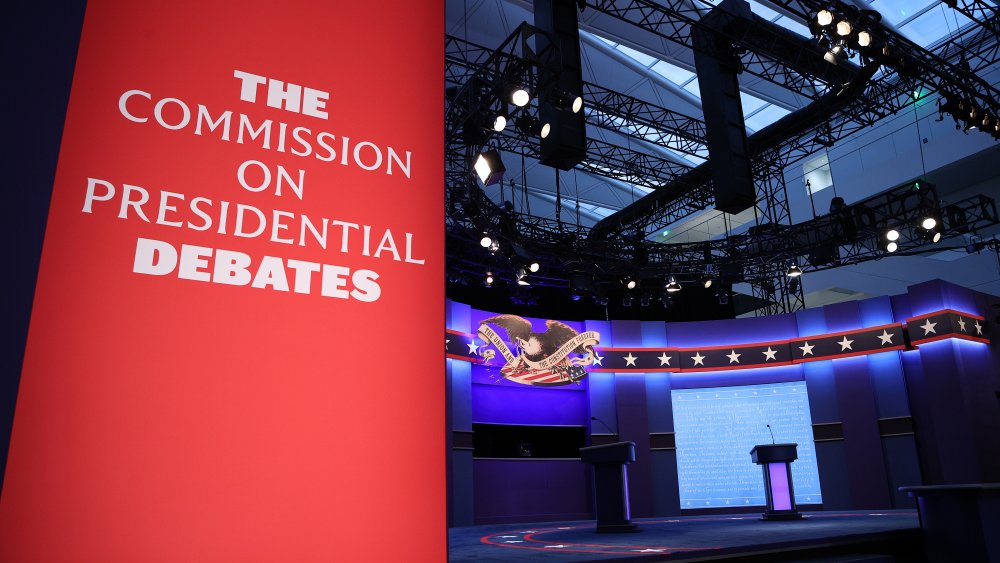Body Language Expert Reveals Ways Harris And Pence Could Lose The VP Debate
The upcoming face-off between vice presidential incumbent Mike Pence and Senator Kamala Harris is likely to draw more interest than previous vice presidential encounters; in 2016, only 37 million Americans tuned in to watch Pence go toe-to-toe with Hillary Clinton's running mate, Tim Kaine, while 84 million had watched the top-of-the-ticket debate the previous week. But these, as the car commercials tell us, are "uncertain times" — and the 2020 VP debate indeed could be one for the history books. Especially given the fact that last week's debate between President Donald Trump and rival Joe Biden was a "hot mess." Plus, with Trump now hospitalized with a COVID-19 infection, more eyes may be on his second-in-command's fitness for office.
So how can we tell how Pence and Harris will perform? In an interview with The List, body language Dr. Reneé Carr, a corporate and political advisor, said that this is an opportunity for both candidates to right some wrongs committed in the first debate. "What everyone would be looking for is corrections of debate that we just saw this past week," Carr said, adding that Pence needs to make up for some of the errors Trump made. Meanwhile, Harris has to avoid alienating people who are not female or racial minorities. She pointed out that there are three specific body-language mistakes both candidates need to avoid.
Appearing angry would be a big mistake for the VP candidates
Both Pence and Harris have the job of remaining calm and civil — no matter what the other candidate says, or what questions are lobbed their way. This is the only way either can attempt to undo the free-for-all that happened between Trump and Biden, Carr explained. So how can we tell if they're starting to get heated?
According to Carr, since people literally heat up — meaning, a rising body temperature — when stressed or irritated, we can look for signs that the veeps are getting uncomfortably warm. "For Pence, what would happen is if he becomes angry, if he becomes frustrated, if his neck is a little bit red, then that lets you know that ... she's getting under his collar," Carr explained. For Harris, however, Carr said to take a look at her right arm and see if she extends it. That's actually a sign of aggression and reveals Harris is being a little more combative and emphatic with her points, Carr explained.
Pence and Harris have to watch how they use hand gestures
The way a political candidate uses his or her hands in a public appearance subconsciously indicates how confident each contender is when he or she speaks, Carr said. However, gender roles mean that each of these VP candidates will have a different goal when it comes to how they use their hands to communicate. "If Kamala were to use less hand movements and she's holding onto the podium, then she's using that ... because she's nervous. She's trying to keep herself composed. She's trying to not use hand movements," Carr explained. "And if Pence were to then use more hand movements, then he would be becoming more nervous or unsure what to say."
One gesture Harris needs to avoid at all costs is pointing, Carr added. This is seen as aggressive, and could alienate voters who feel uncomfortable about a woman being elected to high office. "What she would be best to avoid is this, pointing your finger at the camera. If she could avoid doing that, which is what she does sometimes, she could have less gestures of her hands and having a body posture that is more demure — but words and facial expressions that maintain her aggressiveness — then I think she'll do well as appearing confident and competent without being a threat to people who don't want a female in office, or who believe that there are stereotypical roles for females," Carr said.
The VP candidates need to show respect on the debate stage
A presidential debate historically has been an opportunity for each candidate to explain their platform and make the case to the American people for why they should be elected. Since last week's debate did not accomplish that goal, according to Carr, the onus is on both Pence and Harris to clearly define their ticket's point of view. "Without acknowledging any apologies for the presidential debate, what they would have to do is to communicate indirectly through their verbal language and body language that they're being respectful of the opportunity to come before America," she explained.
If Pence and Harris are not able to accomplish this, we will have to chalk up their debate as a failure as well. But, Carr has high hopes. "I think if we can see that there is a saving grace, this debate will be intellectual," she said. "It will be a respected platform. It can actually get people to listen to the actual words and ideas and platforms that are being said, and that can then help either party to do well."



